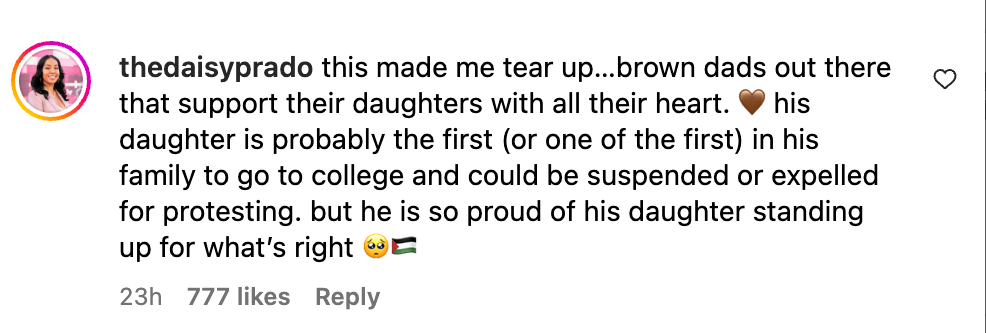
Let’s be real; the holiday season tends to be romanticized as a bright, joyful time full of family, food, and magic. And sure, it can be all that, but more often than not, there’s some tension, stress, and awkwardness sprinkled in.
The thing with a lot of Latino families is that they tend to unknowingly overstep boundaries. Some of us may find it hard to reinforce those boundaries or even speak up and tell our loved ones when they’ve said something hurtful. As a result, we may find ourselves sitting at the table with a nudo en la garganta that ruins the tamales we’re trying to enjoy.
Rather than wasting your precious energy explaining why asking when someone is planning to get pregnant isn’t appropriate, we gathered a few of the most intrusive and tired questions we hear every holiday season and put together some respectful responses.
There is a way to protect your boundaries while still acknowledging that your family’s beliefs and lifestyles may be different from our own.
The age-old questions about “traditional” family
“Y el novio, mija?” could very well be the most commonly asked question, especially if you’re a woman. The question might actually be well-intentioned sometimes (we’ll assume some people mean well and are not just looking for some chisme), but it is deeply rooted in machismo culture and the assumption that, first of all, you should be in a stable, heterosexual relationship because that’s what’s “normal,” is entirely inaccurate.
Second, that you should be in a long-term committed relationship by now ’cause you’re a señorita and the train is leaving the station soon is ageist, and also inaccurate These archaic assumptions then lead to the conclusion that if you haven’t yet landed that soon-to-be husband then something is wrong with you.
The emotional and mental damage that this causes really requires that you learn how to put an end to this question.
One might think if you do, in fact, have a novio, you might be spared from this torturous interrogation. But no, you might get hit with the “y para cuando la boda?” or even worse, the dreaded “para cuando el bebé?”
Childfree women are dramatically increasing because today’s world is vastly different from the world our grandparents or even our parents grew up in. About 44% of people between the ages of 18 and 49 are simply uninterested in having kids of their own. Roughly one-third of adults claim they are either unsure about marrying or do not want to marry at all. Aside from that, fertility issues are becoming more common than ever, with Latinas and other WOC showing a disproportionate amount of endocrine-disrupting chemicals in their bodies that may be harming their reproductive health.
Bottom line is we don’t need to be reminded that our biological clock is ticking. If we’re not already starting a “traditional” family, it’s probably because either we can’t or we do not want to at the time, or maybe ever. Either way, it is a deeply personal issue that should probably not be discussed over romeritos and bacalao.
A way to redirect the conversation is to instead ask them about their personal projects and interests.
The question can be answered (or ignored if you choose) with a simple “no,” then redirected with a, “So, prima, what have you been up to these days?” Or, “Have you finally taken up that new hobby we talked about last year, tía?” “How’s it going with your salsa classes, sis?”
Remember, there’s just so much more to a person than who they’re with or what their family may look like so despite that being the center of their worlds, simply and genuinely inquiring about something else in their world will often do the trick to shutting down those intrusive questions.
Aprende de tu prima
Living up to our family’s expectations is never easy, and it can certainly take a toll on those who have strayed from the “ideal” path one is expected to follow. As the eldest granddaughter, trust me, I would know.
I got hit with the “aprende de tu prima” card the second my younger cousin announced her engagement. And although it was “all in good fun,” I couldn’t help but feel a hint of shame that just didn’t belong to me; it was bestowed upon me the minute someone made the comparison between us two. “You should’ve gone first because you’re the eldest!”
It’s silly the way our family expects us to act as if we’re on a conveyor belt that takes us from school to school ’til we get a bachelor’s degree, then score a well-paid job, find true love, get married, start a family, have our offspring go through the exact same thing until eventually, we reunite with whoever sent us to this earth in the first place.
It’s just so unattainable it seems weird to even imagine comparing people based on where they’re currently at in their lives and then expecting every single person to do life exactly the same
What makes us interesting is our unique stories and what we bring to the table as individuals. So instead of comparisons, we can show appreciation and gratitude to our loved ones for what they are instead of what we expect them to be. This is perfectly ok to explain in response to this horrid question.
Ay, mija, estás embarneciendo
For the longest time, I didn’t even know what “embarneciendo” meant, just that my abuelita said it to me and my primas almost every time we got together. Eventually, I learned it meant that I was putting on some weight. To make it sound less critical, sometimes they would describe it as “healthy weight.”
In many Latino families, commenting on other people’s bodies is usually considered normal. It often starts from a very young age and might affect how we see ourselves and others throughout our whole lives. These comments might be disguised as coming from a place of concern. Still, hearing them can be very detrimental to our self-esteem and self-image, especially when we’ve been trying so hard to work on that ourselves.
Not to mention others might not be aware of the mental and physical health issues one might be facing that can manifest as weight gain or weight loss. Yep, “te ves más flaca” isn’t exactly a compliment, either, even though people might mean it as one.
Old habits die hard, and despite feeling annoyed every time you hear it, you might actually say these things too. Appearance is so ingrained in both American and Latino culture that we sometimes don’t even realize we are participating in the same behavior we dislike.
Fortunately, there are many ways we can compliment others without commenting on their weight or appearance. Bet your tía spent hours mastering a new healthy recipe. Ooh, la prima absolutely slayed her last exam. And abuela, your dichos are hilarious, tell us more!
See? That wasn’t so hard!
It’s never too late to change, and although it may seem like things have been a certain way forever, change is gradual, and we are all learning as we go. Although it may not seem like it, the mere act of speaking up about how something makes you feel can make waves and eventually help reshape the way your family interacts with one another, one Navidad at a time.








 Image shared by
Image shared by  Comment shared by
Comment shared by  Comment shared by
Comment shared by  Comment shared by
Comment shared by 
 Photo by Caleb Oquendo:
Photo by Caleb Oquendo: 